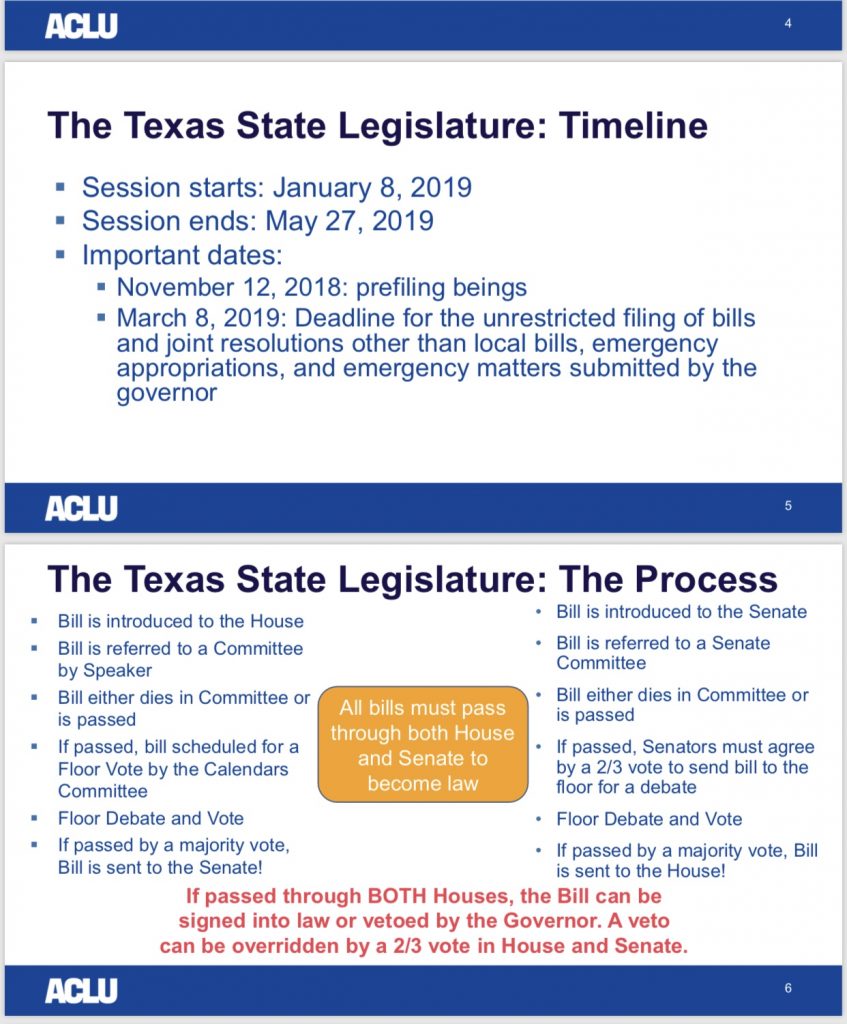
/https://static.texastribune.org/media/files/fd9078bce53a0011af6e4e60e4cc80ce/TT-86Preview_leadart-tt.png)
- 86TH TEXAS LEGISLATIVE SESSION BILLS HOW TO
- 86TH TEXAS LEGISLATIVE SESSION BILLS UPDATE
- 86TH TEXAS LEGISLATIVE SESSION BILLS FULL
We’re going to be scaling up quite quickly.īottom line: Looks like a well-intentioned unfunded mandate to me. What was once an elective now becomes a requirement for all high school students. We will need to train teachers to teach this course, create room on the master schedule, hire more teachers to teach this course, and purchase instructional materials for this course. This is good information for our kids to have so that they will be able to better take care of themselves and their families.Ĭons: The former school administrator in me immediately thought about staffing. Pros: Everyone, including our elected officials, could benefit from a better understanding of personal finance.
86TH TEXAS LEGISLATIVE SESSION BILLS HOW TO
It will be a fun SBOE meeting to determine how to amend Chapter 74 for that flexibility, but that’s an opportunity for entertainment for another day. The version that passed the House includes some flexibility in using existing courses that already include PFL to meet this content.

/static.texastribune.org/media/files/16069673cceb6e3e0cce96324421cb75/Seton_Trauma_Center_03.jpg)
HB1182 and its companion bill SB686 change the graduation requirements to include 0.5 credit in “personal financial literacy” for all students, sort of like the 0.5 credit that Health used to be. It’s baaaack! I thought personal financial literacy (PFL) had been settled when we included it as a strand in K-8 math, created a Financial Mathematics high school mathematics course that counts as “advanced math” on the Foundation diploma, and created a 0.5 credit social studies elective course.

Status: Passed the House and has been referred to the Senate Education Committee. Unless the Senate does something crazy with it, we’ll be OK if this bill does or doesn’t become law.
Any proclamation cannot exceed 75% of IMA money, leaving the remaining for technology or other IMA-allowable purposes.īottom line: We’re going to revise mathematics TEKS with or without this bill. This could be a good way to reduce costs of future proclamations. 86TH TEXAS LEGISLATIVE SESSION BILLS FULL
Allows the SBOE to issue a full call for instructional materials, a supplemental call, a call for new information demonstrating alignment of already-adopted materials to new or expanded TEKS, or a combination thereof. They have a schedule now, so I’m hoping this would comply with HB663 should it become law. SBOE shall adopt a schedule to do this review and revision. In practice, this means streamlining since you can’t add content to a grade level without triggering new instructional materials. SBOE must (another fun word) ensure that any revisions before September 2022 do not trigger a need for adopting new instructional materials. require less time for mastery of the full set of TEKS at a grade level. be more narrow in scope than they were on January 1, 2019. SBOE shall (read: thou shalt) review the TEKS for each foundation curriculum area and revise them to:. So here are the main ideas of the HB663 that passed the Texas House. Both of these objections have been addressed prior to House passage, so I think we have a good bill that gives the SBOE clear guidance on what the Legislature intends for the TEKS to be. My original objection was twofold: (1) mathematics doesn’t streamline well, and (2) an arbitrary deadline forces good people to rush and make bad decisions. I can live with that since mathematics is scheduled for revision in 2023 anyway and there is near universal agreement that while our mathematics TEKS are strong, there are some places where we clearly need revision. This is an improvement over the original version that required all streamlining by 2022 ( see my blog post on HB663 here). HB663 requires TEKS revision (streamlining) and allows the SBOE to set a schedule to do so. Math Curriculum Bills HB663: TEKS Revision 86TH TEXAS LEGISLATIVE SESSION BILLS UPDATE
I’ll update this page or subsequent pages as things develop. Both the House and Senate are laser-focused right now on school finance, so that’s going to take the lion’s share of their time and energy. When the end of the session approaches, things will begin to move quickly.
May 22: Last day for Senate Bills to pass full House (more midnight filibuster fun!) and for Senate to consider all bills. May 18: Last day for Senate Bills to clear House Committees (more dead bills if they don’t get voted out of committee). May 17: Last day for House Bills to pass full House (here’s where the filibuster gets fun since any house bill not passed by midnight dies). May 6: Last day for House Bills to clear House Committees (any bill that doesn’t get voted out of committee dies). There are approaching deadlines when bills die en masse, which is what the process is designed to do. As April comes to an end, we have several approaching mass extinctions of bills.


/https://static.texastribune.org/media/files/fd9078bce53a0011af6e4e60e4cc80ce/TT-86Preview_leadart-tt.png)

/static.texastribune.org/media/files/16069673cceb6e3e0cce96324421cb75/Seton_Trauma_Center_03.jpg)



 0 kommentar(er)
0 kommentar(er)
